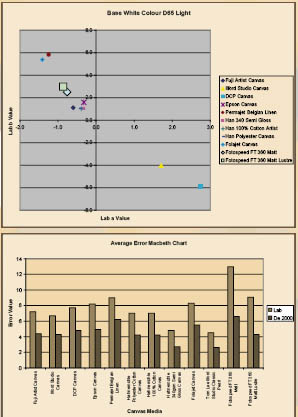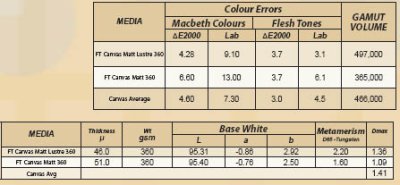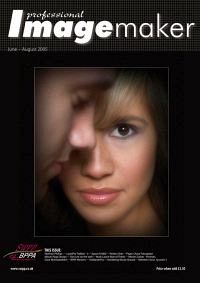articles/Paper/fotospeedproduct-page1
Paper Chase - Fotospeed Product - part 1 of 1 2
by Mike McNamee Published 01/06/2005

Fotospeed provide a number of specialist products for the silver halide and inkjet imaging markets. We look in this Paper Chase at their tough canvases and their "Extended Gamut" fine art papers.
The Canvases
There are two canvases in the FT range. They are formulated to be tough so they can withstand the rigours of being stretcher mounted by conventional framing methods - this can crack the surface of weaker materials. The actual weave structure for both products is the same, an Oxford twill, that is with twin warp fibres if slightly smaller diameter than the weft which is a weaker and softer strand. It is a relatively soft canvas and cuts easily with a scalpel. There are two coating options a Matt and a Matt Lustre both at 360gsm. The matt finish is enhanced slightly with an optical brightener, causing a lift of about 6% at 440nm. Both finishes are on the cream side of neutral and their position on the Lab plot is compared, in the graph, with other canvases we have reviewed. The picture on the next page shows the surface finish.Paper Chase
Both media were bespoke profiled, then colour audited. The summary data are tabled,below right. Both materials are slightly behind others we have tested (the price of toughness perhaps?). The Matt finish has the lowest Dmax we have measured. All the colour data will be improved by the application of a varnish. The Lustre Matt image was ruined by the application of the aqueous, DCP Giclee varnish; the Matt was reasonably water resistant and a single coat raised its Dmax to 1.27. Both materials are better suited to the solventbased Frog Juice available from Fotospeed. We also applied a test coat of Bohle Satin Varnish to the Matt Lustre. This lifted the Dmax up to 1.68, quite a significant improvement.
Both surfaces were undamaged by tight stretching over a sharp edge and seem to live up to their tough image. The preferred method of working would thus seem to be conventional stretcher mounting followed by a coat or two of Frog Juice, to both protect the surface and improve the depth of the colour.

fotospeed, paper, printers
The EG - Extended Gamut Series
These papers are billed as having an alpha cellulose ink-receiving layer which extends the gamut. They are made by the Fourdrinier process for competitive pricing, whilst maintaining the acid-free, 100% cotton rag "museum grade" tag for the fine art fraternity. They are all greater than the 250gsm demanded by the Fine Art Trade Guild. The High White Smooth and DW Photo contain optical brighteners, which might disqualify them for some fine art printers.
The surfaces are shown in glancing light in the macro image. As with all papers it pays to obtain a swatch set or sample pack before deciding on a preference. The DW Photo is the smoothest, followed by the High White Smooth. The Natural Textured has a distinctive pattern quite like a mould-made paper. The two "Natural" papers are pleasantly creamy, the other two are progressively cooler - see the graph plot.Paper Chase
Colour Performance and gamut Each of the papers was bespoke profiled using the X-Rite DTP 41 and the latest version of Monaco Profiler (4.7.1) with the profile being built to map the greys to the base colour of the paper, at D50 lighting conditions. These data are tabled above. Our software allows us to calculate the actual gamut volume for each paper/ink combination (Epson 4000 using Matte Black Ink). For comparison we include data from Hahnemuhle photo rag, an industry standard, available in a number of guises. There is nothing in the data to suggest an "extended gamut". The average for 18 art paper combinations recently tested had a gamut volume of 515,000 Lab units. Despite this bitch about the advertising hype these papers are excellent, it is just a problem to see where the gamut is extended (see 2-D graph).
The colour error data are also tabled below. They show the characteristics of papers in each of their classes. The "naturals" are really good on flesh tones with their warm cream under layer; the DW photo has the lowest metamerism making it a good candidate for monochrome reproduction. The average values for the Macbeth colours are on or below the average for the hundreds of printers we have tested - we quite rarely see values below 3.0 for De2000.
You are currently on page 1 Contact Mike McNamee
1st Published 01/06/2005
last update 09/12/2022 14:54:23
More Paper Articles
There are 0 days to get ready for The Society of Photographers Convention and Trade Show at The Novotel London West, Hammersmith ...
which starts on Wednesday 15th January 2025





